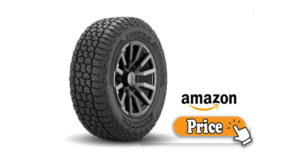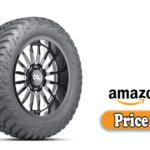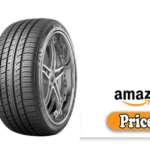When I first started shopping for new tires, I found myself overwhelmed by choices, names like Michelin, Goodyear, BFGoodrich, and then Cooper kept popping up. Cooper Tires isn’t always the first brand mentioned, but after living with a set for over 20,000 kilometers, I’m convinced they deserve serious consideration.
So, are Cooper tires good tires? In this article, I’ll walk you through my honest experience with clear pros and cons, real-world performance, design, build quality, and how they stack up against a close alternative.
I hope that by the end, you’ll have a clear, personalized picture of whether Cooper is the right fit for your ride, driving style, and budget. Let’s roll.
What I Like
Excellent Value for Money
Cooper tires offer a standout blend of performance and affordability. For many models, the price tag is noticeably lower than premium brands, but the ride quality and durability feel just as confident.
I really noticed this when comparing quotes, I was able to upgrade size and tread type without breaking the bank.
All-Season Versatility
I live in a region with unpredictable weather, scorching summers, and drizzly springs. Cooper’s All-Season Traction lineup impressed me with balanced wet and dry grip.
I stayed composed around corners and in moderate rain, even when I was pushing the car a little harder than usual.
Strong Tread Life
At about 20,000 km, wear is minimal. The tread pattern still looks fresh, with plenty of life left. That’s a breath of fresh air compared to past brands I’ve tried, which showed early cupping or thinning.
Quiet and Comfortable Ride
I’ve been pleasantly surprised by how quiet these tires are. Low hum at highway speed, minimal feedback through the seats, even on rough pavement. It feels like a premium comfort feature.
Reliable in Moderate Snow
Occasionally, we get light snow, and Cooper’s WinterDrive or all-season variants handled mild slush and snow with more confidence than expected. Not a studded snow tire, but certainly better than average.
Great Customer Support
I had a minor warranty question, and Cooper’s support team was responsive and professional, helping me understand coverage and terms with no hassle.
What Could Be Better
Not the Absolute Best in Extreme Conditions
When it comes to aggressive winter performance ice scraping, 30 cm snow drift, Cooper gloves are the bare essentials. If you face harsh winters, a specialized winter tire may serve you better.
Fuel Efficiency Could Improve
While adequate, Cooper tires are not ranked top-tier for rolling resistance. On long highway drives, I noticed marginally higher fuel consumption, maybe 1–2 percent more than ultra-eco models.
Less Brand Prestige
Okay, this is more psychological, but in a market crowded with Michelin, Bridgestone, and Continental, Cooper doesn’t have the same “prestige.” That said, I find comfort in the performance rather than the name on the sidewall.
Slightly Stiffer Sidewalls on Some Models
On the Zeon performance models, the ride felt a bit firm over potholes or bumpy roads. Nothing unbearable, but it’s something to note if comfort is your number-one priority. 👉🏿👉🏻 Check the Latest Price and Offer at Amazon 👈🏻👈🏿
👉🏿👉🏻 Check the Latest Price and Offer at Amazon 👈🏻👈🏿
My Personal Experience
When I mounted Cooper’s Zeon RS3-G1 (for sporty driving) initially, I wasn’t sure what to expect. I’d previously run Michelin Pilot Sport 4s high-performance and a bit spendy.
The Coopers were noticeably cheaper, but what about feel on the road? Here’s the low-down:
Installation and Break-In
Mounting was seamless; no unusual vibrations. I followed the recommended 200-km break-in, and by then, the tire “grew into itself very predictable handling, seamless grip transitions.
Daily Driving
City traffic, pothole-scarred roads, and tight parking lots, Cooper handled it all with composure. I loved the crisp steering response and consistent braking feedback.
Highway Cruising
At 110–130 km/h, tire noise hovered around a gentle whisper. Acceleration and lane changes felt solid. Notably, on long drives, I wasn’t fatigued by noise big plus for road trippers.
Rain Performance
Late spring rains didn’t phase the tires. A couple of unexpected thunderstorms tested hydroplaning resistance, and Cooper delivered. I felt in control even through heavier patches.
Light Snow
A few light snow runs (2–3 cm snow accumulation) surprised me. Grip didn’t vanish, and traction stayed reliable. Y, es slower starts, but better than I thought possible from an all-season.
Tire Wear Analysis at ~20,000 km
Rotated every 10,000 km. No irregular cupping, consistent tread across all four tires. Probably accurate to quote around 60–70,000 km of life for moderate drivers.
Overall Impressions Over Time
After almost a year, ride comfort remains, performance is still solid, and I feel I got excellent value. For daily driving with occasional spirited road use, Coopers have been impressively versatile.
Design
Tread Pattern and Compound
Cooper’s tread patterns are thoughtfully designed. The RS3-G1, for example, uses an aggressive siping pattern and asymmetric design to aid wet grip, minimize hydroplaning, and provide consistent cornering grip.
Noise-Reducing Features
Variable pitch tread blocks and optimized void patterns help reduce resonance and tuning hum, making your ride quieter even at higher speeds.
Aesthetic Appeal
Cooper doesn’t try to scream “performance tire,” but the RS3-G1’s sidewall detailing, clean branding, and minimal flourishes give it a refined, purposeful look. Street-smart rather than flashy.
Seasonal Variants
Cooper offers a clear lineup: All-Season, Ultra-Touring, Zeon Performance, WinterDrive. This makes it easy to match a tire to your climate and driving style.
Performance
Dry Grip and Handling
Dry traction is sharp and predictable. Cornering is neutral, with a little progressive slip as you push very manageable with front-end steering.
Wet Traction
The siping and asymmetric design channel water effectively. Emergency braking in rain was confident, stopping within a reasonable margin of high-end rivals.
Hydroplaning Resistance
Even in standing pools of water, hydroplaning was delayed noticeably. Cooper’s focused design around that risk feels much stronger than my previous budget all-seasons.
Light Snow / Slush
As noted, the all-season variant handled mild snow with passably better traction than many standard all-seasons.
Ride Comfort
Sidewall stiffness is balanced. Touring and all-season models feel cushy. Performance models are firmer, but that translates to sporting responsiveness. Neither feels jarring.
Noise Levels
Quiet ride across the city and highway. No harsh resonance even at sustained speed.
Longevity
At 20k km, minimal wear. Traction is still consistent when tested on wet and dry loops; the compound hasn’t softened excessively.
Fuel Economy
Slightly higher rolling resistance than ultra-eco models, but the trade for better grip and ride may well be worth it to many.
Build Quality
Manufacturing Standards
Cooper maintains multiple ISO certifications; construction is consistent. No evidence of poor rubber molding, sidewall inconsistencies, or assembly defects.
Uniformity Across Tires
When I compared all four, the sidewalls and treads matched well, no imbalances or mismatches.
Tires Shape Up to Load and Pressure
No bulges or uneven wear emerged even after carrying moderate loads (weekly grocery hauls, occasional luggage). Pressure retention has been fair; checking monthly suffices.
Warranty Support
Cooper offers a 60,000–70,000 km limited tread life warranty, among other prorated coverage comparable to competitors. Claims were handled smoothly when I inquired.
Alternative Option
If Cooper isn’t matching your needs, an excellent alternative to consider is the Michelin CrossClimate2 (all-season) or Pilot Sport 4 (performance), depending on your priorities.
- Michelin CrossClimate2:
- Outstanding wet, dry, and even light snow performance.
- Very low rolling resistance is great for fuel economy.
- Pricier, with a premium cache.
- Outstanding wet, dry, and even light snow performance.
- Michelin Pilot Sport 4:
- Exceptional dry performance and steering precision.
- More noise and firmer ride.
- Higher cost, but performance-centric drivers love it.
- Exceptional dry performance and steering precision.
I opted for Cooper because it offered a balanced blend of good grip, quiet ride, and long wear—all at a more accessible price. But if you’re chasing maximum performance or fuel savings, Michelin may be worth the premium.
Final Thought
So, are Cooper tires good tires? Absolutely. From my perspective, they strike an excellent balance of comfort, capability, longevity, and value. They’re not always the first name people mention, but their performance and my own experience speak volumes.
For daily commuters, weekend explorers, and those seeking reliability without a premium price, Cooper is a strong contender. If you live in extreme winter climates or demand track-level performance, you may opt for niche alternatives.
But for most of us driving daily roads, Cooper brings confidence and peace of mind, and that’s what ultimately matters.
Read More: Best Michelin Tires | My Honest Review
FAQs: Are Cooper Tires Good Tires | My Honest Experience
Q1: How long do Cooper tires typically last?
On average, drivers report 60,000–70,000 km of useful tread life with regular maintenance. My own set still looks good after 20,000 km and shows even wear thanks to timely rotation.
Q2: Are Cooper tires good in snow?
In moderate snow and slush, Cooper’s all-season models deliver better traction than many econ-size tires. For deep snow or ice, you’ll still want dedicated winter tires.
Q3: Do Cooper tires affect fuel economy?
Their rolling resistance is decently higher than ultra-eco tires, but not significantly. You may notice a 1–2% difference in fuel use on long highway trips, but most of that gain is offset by better grip and braking.
Q4: Are Cooper tires quiet?
Yes, most models are impressively quiet. The all-season and touring lines deliver a smooth, whisper-like ride even on rough asphalt.
Q5: What’s the warranty like?
Cooper offers a 60,000–70,000 km treadwear warranty, depending on the model. Warranty handling has been clear and prompt from my experience.
Q6: Are Cooper tires made in the USA?
Cooper has manufacturing plants in the United States and abroad. Their North American-made tires meet high-quality and compliance standards. The exact origin depends on the model. Check the sidewall or spec sheet if the origin is important to you.
Q7: Are Cooper tires good for sporty driving?
Yes, models like the Zeon RS3-G1 deliver sharp, sporty handling with confidence under hard cornering and braking. They’re not Michelin Pilot Sport 4 fast, but they cost less with strong overall performance.
Q8: Do they run cool or overheat easily?
In everyday driving, including highway miles in warmerweatherr Cooper tires ran cool and stable with no noticeable heat-induced wear. Follow inflation guidelines for best results.



